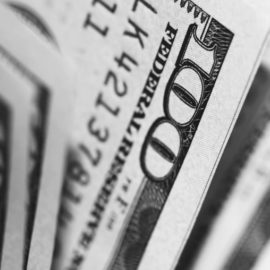

This article is an excerpt from the Shortform book guide to "Fooled By Randomness" by Nassim Nicholas Taleb. Shortform has the world's best summaries and analyses of books you should be reading.
Like this article? Sign up for a free trial here .
What is Nassim Taleb’s Fooled by Randomness about? What role does luck or randomness play in success?
Fooled by Randomness is the first work in a five-book series exploring randomness by bestselling author and former options trader Nassim Nicholas Taleb. In this book, Taleb examines the outsized role luck plays in success, how and why people don’t generally understand luck, and how we can accommodate randomness in our lives once we’re aware of it.
Below is a brief overview of the key points.
Nassim Taleb: Why Wild Success Is Due to Luck, Not Skill
Usually, when we see someone fabulously successful, we attribute her success to skill. But skill will generally only earn a person moderate success.
In Fooled by Randomness, Nassim Taleb argues that wild success, the kind that comes with outsized wealth and lasting fame, is usually due to luck: a fortunate rare event plus a lack of negative rare events.
This is more true in industries that rely heavily on chance, such as investing, than it is for professions like carpentry or medicine that are built more on perseverance and skill. Often, though, people don’t recognize how fundamentally different chance-based professions and skill-driven professions are in how they each produce success. This misunderstanding, and the tendency to credit success to skill instead of luck, can lead people to make poor decisions.
Some ways in which we misunderstand the effect of luck on success are explored in the following sections.
Survivorship Bias Misguides Our Thinking
People tend to see examples of enormous success as representative of the kind of success any person can expect in that industry. This is called the “survivorship bias,” by which we see only the people who have “survived,” that is, thrived in any given situation, and we extrapolate lessons from their survival: mainly, that wild success can be reasonably expected.
For example, when an investor strikes it rich or a writer lands a multi-million-dollar movie contract, we often internalize those successes as a likely possibility for anyone in those fields. However, to accurately evaluate the potential for success in any venture, you must consider not only the observable results but also the invisible alternatives: the possibility that those successful people might have failed had they experienced unluckier circumstances.
So, to properly determine the likelihood of getting rich as a trader, you must take into account the many people who’ve attempted it and failed, not just those who’ve made a fortune. To properly judge the likelihood of getting rich through writing, you must consider all the authors who couldn’t find a publisher, or those whose published book garnered few sales, not just those who penned bestsellers.
Looking at invisible alternatives allows you to better see the role luck plays in your successes and failures. What might have happened if the market hadn’t jumped 500 points that morning? What if that large bet you made on that particular stock hadn’t worked out?
Getting into this habit can take practice. It’s easy to spot the chance inherent in a clearly-defined, hypothetical situation: for example, a game of Russian roulette in which you are offered fifty million dollars to shoot a gun loaded with one bullet and five empty chambers at your head.
It’s less easy to spot the random nature of professions that hew closer to mainstream sources of income and have less-clearly-defined parameters, like trading. Because there are so many elements involved in trading, the randomness driving it is better hidden and consequently, people tend to be blind to it—they then assume that success in such a field is due to skill in the same way that success in a non-luck-driven field (such as, for example, teaching) would be.
Rare Events Have an Outsized Influence
When we speak of luck or randomness determining success or failure, we are talking specifically about rare events and their outsized influences on any particular path. Rare events are infrequent and usually unpredictable events that bring with them either a huge payoff or a devastating wipeout. Very often a person who’s had wild success has merely been lucky enough, so far, to either take advantage of a positive rare event or to elude a negative and devastating one.
History is littered with rare events, but it’s impossible to know exactly when and where they are going to hit. This is why people tend to ignore the probability of rare events; it is hard to plan for something you can’t predict, and it’s hard to understand something that doesn’t follow the rules.
However, when you don’t understand how rare events work and how significant their influence is, you are unable to properly assess risk and opportunities, or to clearly see what’s shaping the world around you—including your success.
Track Records Are Poor Indicators of Future Success
Because of the nature of randomness and rare events, given a large starting set of people, a certain percentage will inevitably end up wildly fortunate, regardless of their skill or competence. For example, imagine a set of 10,000 traders, each with a 50 percent chance of either making money or losing money every year. Assume that if a trader loses money, she’s out of the game. After the first year, there will be 5,000 traders left. After five years, there’ll be just over 300 traders left. The continued success of these 300 traders might be due entirely to luck, but in the real world, each of these traders would be lauded for her skill.
Because of this, it is impossible to judge a person—particularly in a luck-based field—based on her track record, which might indicate nothing more than a lucky streak. You should be wary of anyone touting their excellent track record if they work in a profession that relies on chance.
Sometimes the Most Qualified Competitor Does Not Win
Because of the nature of randomness, life can be unfair. The most capable companies and the most skilled people are not the always ones who achieve success. Consider that if we ran the simulation above so that each trader only had a 45 percent chance of making money in a year, at the end of five years we would still have almost 200 traders still in the game. These traders would be celebrated as extraordinary even though they were slightly incompetent (as illustrated by their greater-than-even chances of loss).
Why We’re Bad at Assessing Randomness and Risk
People find it hard to properly assess the likelihood—or probability—of randomness for several reasons:
- We read the past wrongly, misunderstanding the probabilities that drove events that have already happened.
- We find it hard to apply lessons of the past to the future.
- We also think in shortcuts driven by misunderstandings and biases.
These concepts are explored further in the following sections.
We Don’t Properly Interpret the Past
One reason we’re bad at assessing and preparing for the risk of rare, random events is because we are not good at learning from the past. We mistakenly believe that because something has never happened before, it can’t happen now.
Further, even when we do remember a past rare event, we tend to believe we now understand the events that led up to it, and we therefore think we can “predict” it; that is, if it were to happen again, we wouldn’t be taken by surprise: We’d see it coming and be able to minimize our losses. However, this is rarely the case; when something is happening in real time, we are too close to judge which events will end up being consequential and which will not. We can typically only have clarity on an event when some time has passed. For example, we can look back on the stock market crash of 1929 now and clearly see the warning signs; at the time, though, those signs would have been harder to spot.
We Can’t Understand the World Through Observations Alone
The past is a poor teacher in another way, too: When we look back on it, we only see what actually happened. We stay blind to the possible events that might have happened.
This is the classic problem with “induction”: the method of understanding the world by making observations and drawing conclusions from them. When your theories of the world are based on only what you can personally observe, you’ll miss rare events.
For example, you may look at thousands of swans, see that each one is white, and conclude that all swans are white. However, some swans are black. They are rare, and if you don’t live in Australia you might never see one, but they do exist and they disprove your conclusion.
You can use observations to disprove a theory, but you can’t use them alone to prove one. Just one counterexample is enough to disprove a theory based on millions of observations.
We Can’t Predict the Future
Even when we can see the past clearly, it’s still hard to apply those lessons to the future because it’s difficult to break through the noise of the present and know in real time which events are going to change the course of history in a significant way. This makes it hard for us to see a rare event coming.
Noise Prevents Clarity
“Noise” is the overwhelming deluge of facts that bombards us from newspapers, television, online outlets, and so on. It includes up-to-the-minute stock fluctuations, daily explanations of market moves, and endless analyses of companies, most of which will be out of business within a decade. Small changes in the market are random, and paying close attention can lead you astray, convincing you that unimportant things have larger consequences than they actually do. The passage of time generally filters out noise, allowing you to see what ended up mattering.
Avoid getting caught up in noise by limiting your exposure to it. Ignore the day-to-day headlines and allow yourself to see events from a distance of time. That way, when something of significance happens, such as an important IPO or market movement, you will be better able to recognize it and act on it.
The Future Is Changeable
The future eludes us in another way, too. The future is affected not just by outside influences but also by our own understanding of those influences. Our predictions of the future can themselves change it. For example, if traders as a whole notice that the market always rises in March, they would all buy stocks in February in anticipation of the rise. Consequently, the market would no longer rise in March; it would rise in February.
Because of this, if everyone fully and properly understood the past, their predictions would no longer hold true because the preparations they’d make for the future event would prevent the event from happening as expected. The tendency of the future to repeat the past depends upon our being driven by the same invisible forces that drove past events. Thus, rare events like stock sell-offs exist because they are unexpected; if they were expected, people would prepare for them and the sudden sell-off wouldn’t happen.
Our Thinking Shortcuts Misguide Us
Our brains have developed shortcuts of thinking that allow us to react quickly and decisively to threats. We’ve evolved these shortcuts to save ourselves time and mental energy; if we were to stop and think thoroughly about each interaction we have throughout the day, we would either miss opportunities or succumb to threats.
Unfortunately, because these shortcuts lead us to believe many things without fully thinking them through, our views of the world are often based on misunderstandings and biases we unwittingly hold. This prevents us from correctly evaluating probabilities and the likelihood of a rare event affecting us. A few of these misunderstandings and biases are outlined below.
We Make Decisions Emotionally
We make decisions and evaluate risk almost entirely through our emotions, and we only use our rational brain afterward to justify our decisions. For example, you might fall in love with a particular car, purchase it, then justify the decision afterward based on gas mileage and interest rates.
Without any emotions, we can’t make decisions at all (as evidenced by brain-trauma victims who lose the ability to feel and end up unable to choose between rational options), but the flip-side is that emotions can steer us wrong by blocking out our rational thinking and leading us to misjudge risk.
We Like Simplicity
To better identify risk, the primitive and emotional parts of our psyche have evolved to quickly scan the environment for threats. Because of this, we don’t like complexity. We respond best to simple concepts that are easily understood and quickly summed up. We therefore tend to gloss over the finer points of probabilities, which are not only difficult but are often also counter-intuitive.
We Notice Surprises
The primitive and emotional sections of our brain also pay much closer attention to surprises than to run-of-the-mill news. We attach greater significance to shocking events even if they are not ultimately important, and we tend to believe events that are more easily brought to mind are more likely to occur. We therefore overestimate the risk of unlikely events while ignoring the risk of more likely ones. We can see this in how the media covers bizarre but relatively unthreatening news (like mad cow disease) while ignoring much more common, and more likely, threats (like car accidents).
We Dislike Abstraction
For most of human history, people had little need to calculate probabilities; we lived simple lives and dealt with tangible threats. Our brains thus evolved to better understand concrete ideas rather than abstract ones, and consequently, we have trouble assessing the risks of abstract circumstances. Studies have shown that when presented with two sets of risks, people will be more concerned about the one that describes specific threats even if the more general threats would also include those specific threats. For example, travelers are more likely to insure against a death from a terrorist threat on their trip than death from any reason (including, but not specifying, terrorism).
We Underestimate the Likelihood of a Rare Event
We dismiss the risk of rare events when we consider the likelihood of them happening in any one specific situation or in one specific way. We then underestimate the larger risk of a rare event happening in general. To illustrate, your odds of winning the next lottery may be one in 25 million. But the odds of someone winning are one in one: one hundred percent. In the same way, the odds of a specific market correction happening on a specific date might be small; the likelihood of any market correction happening on any date is large.
We Misunderstand Sample Size
We often misunderstand opportunities, risks, and probabilities because we evaluate them from too small of a sample size. We extrapolate lessons from just a few examples and apply them to wider situations, resulting in misguided strategies. For example, if a trader makes one right call, people may believe she’ll make more right calls in the future. If she makes one wrong call, they may question her reputation as a skilled trader. Neither assessment may be correct: More evidence is needed to prove either claim.
We See Meaning in Randomness
Our brains are wired to look for meaning, and this often causes us to find meaning where there is none.
People see meaning in intelligent-sounding but empty sentences. When investment funds or advisors publish grandiose statements filled with industry buzzwords, they project an aura of expertise that they may not actually have. Investors often base decisions on such advice or trust those advisors with their money, not recognizing the lack of meaning obscured by the fancy phrases.
People try to find rational explanations for circumstances of luck. When a trader makes a lot of money, people look for reasons for her success; they’ll often credit her intelligence or market-savvy. If she later loses money and is forced out of the game, people will again look for reasons; they might point to relaxed work ethics, for example. In reality, her success may be entirely down to luck.
People look for patterns that might reveal some hidden winning code. Though you can find meaning in any random data points (like constellations of stars), most market movements are random noise and not worth studying for meaning.
We Pay Attention to the Wrong Aspect of Winning
In judging whether or not a strategy is smart, we tend to focus on whether or not there is a high probability of winning, but ignore the more important aspect of how much we might win or lose. Because rare events have an outsized influence, frequent, typical events do not matter as much as infrequent, rare events do. For example, someone who makes her money in large but infrequent bursts, by anticipating rare events, often ends up wealthier than someone who makes her money slowly and steadily but ignores rare events (and thus either misses rare opportunities or succumbs to rare collapses).
How to Avoid Failure in a Random World
Eventually, luck gives way. While short-term success is often driven by luck, long-term success is more often determined by skill, as good or bad luck eventually runs out and outliers of either success or failure eventually earn outcomes more closely matching their skills. This is called “reverting to the mean.” Traders who make bad trades will blow up. Waiters who win the lottery will likely not win it again. People who experience bad luck despite hard work and skill will eventually rise in their station.
Therefore, to avoid failure in our random world, remember that success built on hard work and smart choices is more lasting than that built on luck. Avoid chasing success that relies on luck, such as that born of risky trades. Be aware of the ways your instincts and emotions blind you to the roulette wheel. Prepare for risks and don’t expose yourself to losses you wouldn’t be able to handle. Some specific thoughts on how to develop these sorts of mindsets follow.
Anticipate Your Emotional Reactions
As humans, we are pre-programmed to react emotionally to stimuli—and, as previously noted, our emotions can cloud our judgment. Instead of fighting your emotional instincts, eliminate their triggers. For instance, people instinctively react emotionally to news of market changes, so eliminate such noise from your daily life. Don’t read the market reports, don’t watch television, and don’t scroll through the financial analysis online. Set your alerts so that you are only notified should the market, for example, jump 2 percent.
Don’t Think Like a Bull or a Bear
Don’t focus on whether the market will rise (as in a bullish market) or fall (as in a bearish one); focus instead on the impact that either movement will have on your results. Correctly predicting small market movements might earn you small gains, but hedging against large drops or rises can be much more profitable.
Aim to make money from rare events rather than from slow and steady bets; rare events tend to be more profitable in the long run. Short the market (bet that it will decrease) when you detect it would be significantly more profitable than betting on a market increase, even when an increase is more likely.
Don’t Stay Wedded to Your Positions
Traders who defend their chosen positions long past the point where they’re helpful end up following those losing bets to failure, unwilling to admit errors of judgment in their original positions. Traders who find long-term success are willing to change their positions at any moment as they see conditions change in the market.
To achieve long-term success, acknowledge you are fallible and prone to mistakes and be willing to abandon poor decisions—for instance, an unfavorable position—when it becomes clear they are no longer wise. Then, incorporate the lessons you learn from those mistakes into your future decisions.
Some Final Thoughts
We don’t have control over the random events that happen to us. The best we can do is plan for them and react appropriately when they inevitably happen. Anticipate the risks you can predict, and allow room in your plans for those you can’t.
Keep in mind that no matter how much you plan, randomness will always be ready to strike. Bear this in mind and react with dignity to the rare events that inevitably hit you:
- Greet misfortune with stoicism: a combination of wisdom and courage.
- Face the future with an optimistic yet accepting attitude.
- Don’t act like a victim. Don’t show self-pity.
- Be courteous to those below you; be forgiving of those who contributed to your misfortune.
- Remember that the only thing luck does not control is your attitude.

———End of Preview———
Like what you just read? Read the rest of the world's best book summary and analysis of Nassim Nicholas Taleb's "Fooled By Randomness" at Shortform .
Here's what you'll find in our full Fooled By Randomness summary :
- The outsized role luck plays in success
- How we’re fooled by randomness in many aspects of our lives
- How we can accommodate randomness in our lives once we’re aware of it






